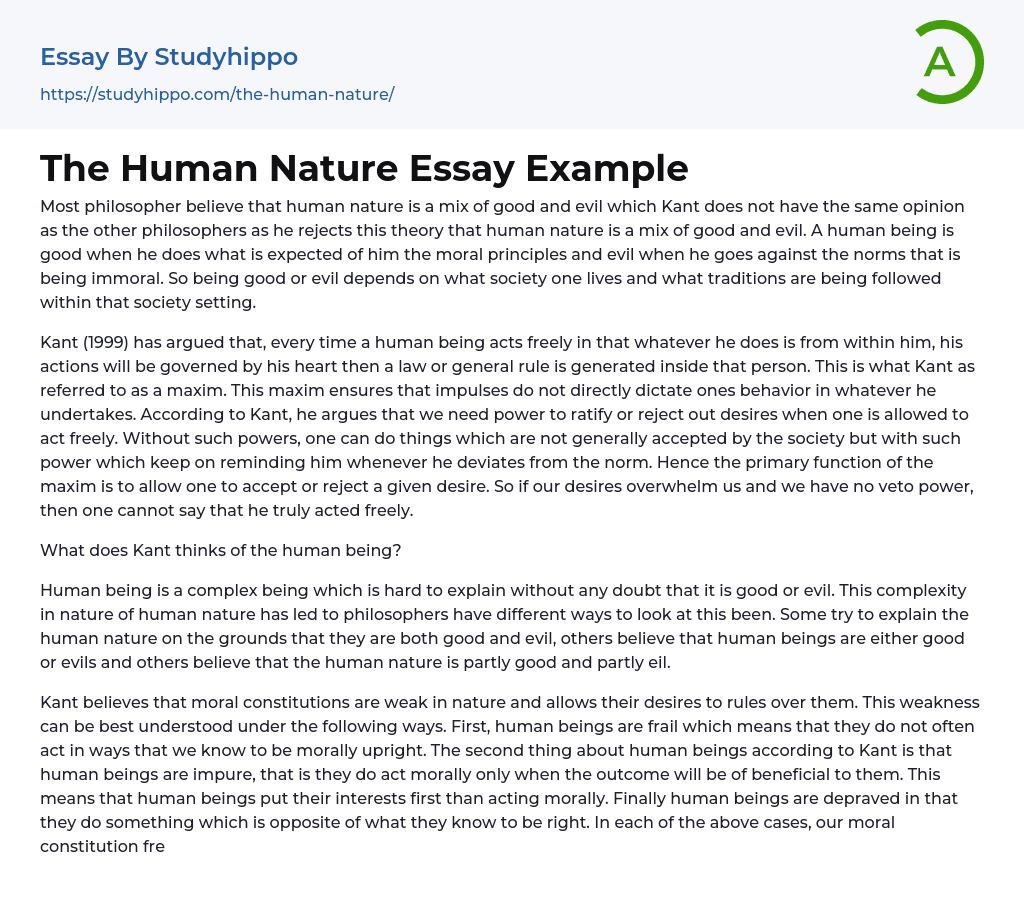Most philosophers believe that human nature is a combination of good and evil, but Kant disagrees with this theory. He rejects the idea that human nature is a mix of good and evil. According to Kant, a person is considered good when they adhere to moral principles and evil when they go against societal norms and behave immorally. Whether someone is considered good or evil depends on the society they live in and the traditions they follow.
Kant argues that when a person acts freely, their actions are governed by their inner self. This leads to the creation of a personal law or general rule, known as a maxim. The maxim ensures that one's behavior is not solely influenced by their impulses. Kant believes that it is necessary to have the power to confirm or reject one's desires when acting freely. Without such power, individuals may engage in a
...ctions that are not accepted by society.
The maxim serves as a reminder to stay within societal norms and allows individuals to accept or reject certain desires. According to Kant, categorizing a human being as purely good or evil without any doubt is difficult. Different philosophers have varying perspectives on the complexity of human nature. Some propose that humans possess both good and evil within them, while others argue that humans are purely good or evil.
Some argue that human nature encompasses both goodness and wickedness. According to Kant, human moral constitutions are inherently weak, allowing desires to govern their actions.
The text highlights the weakness of human behavior, which can be attributed to frailty, impurity, and depravity. According to Kant (1999), this weakness leads individuals to prioritize immoral choices ove
what is morally right due to physical or psychological needs. Kant further discusses the tension between morality and religion, acknowledging that religious traditions often conflict with moral principles. Despite this, Kant believes in a universal moral law that individuals can rely on their own instincts to determine, eliminating the need for dependence on religious organizations for explanation of moral laws. Kant argues against relying on biased interpretations of moral laws and suggests trusting one's own instincts instead. Additionally, adhering strictly to church requirements while maintaining negative emotions like hatred or jealousy sets a poor example and invites criticism from others. Finally, Kant rejects the idea that salvation depends solely on God's grace.Certain religious practices encourage the use of incantations to achieve a closer connection with God. However, this approach may lead individuals to engage in moral actions out of habit rather than genuine righteousness. The fundamental conflict between good and evil arises from immoral motivations conflicting with moral principles. Kant argues that being virtuous requires actively nurturing virtuous inclinations while actively resisting evil. Additionally, Kant proposes that an ideal community should uphold both ethical laws and coercive political laws. He suggests the concept of an "invisible church" as the most effective way to promote ethical laws, serving as an inspiration for tangible churches (Kant 1999).
- Acceptance essays
- Age Of Enlightenment essays
- Child Observation essays
- Confucianism essays
- Conscience essays
- Critical Reflection essays
- Destiny essays
- Determinism essays
- Empiricism essays
- Environmentalism essays
- Epistemology essays
- Ethics essays
- Ethos essays
- Existence essays
- Existentialism essays
- Fate essays
- Free Will essays
- Functionalism essays
- Future essays
- Good And Evil essays
- Human Nature essays
- Individualism essays
- Meaning Of Life essays
- Metaphysics essays
- Natural Law essays
- Personal Philosophy essays
- Philosophers essays
- Philosophy Of Life essays
- Political Philosophy essays
- Pragmatism essays
- Reality essays
- Relativism essays
- Teaching Philosophy essays
- Time essays
- Transcendentalism essays
- Truth essays
- Utilitarianism essays
- Bacteria essays
- Biotechnology essays
- Breeding essays
- Cell essays
- Cell Membrane essays
- Cystic Fibrosis essays
- Enzyme essays
- Human essays
- Microbiology essays
- Natural Selection essays
- Photosynthesis essays
- Plant essays
- Protein essays




